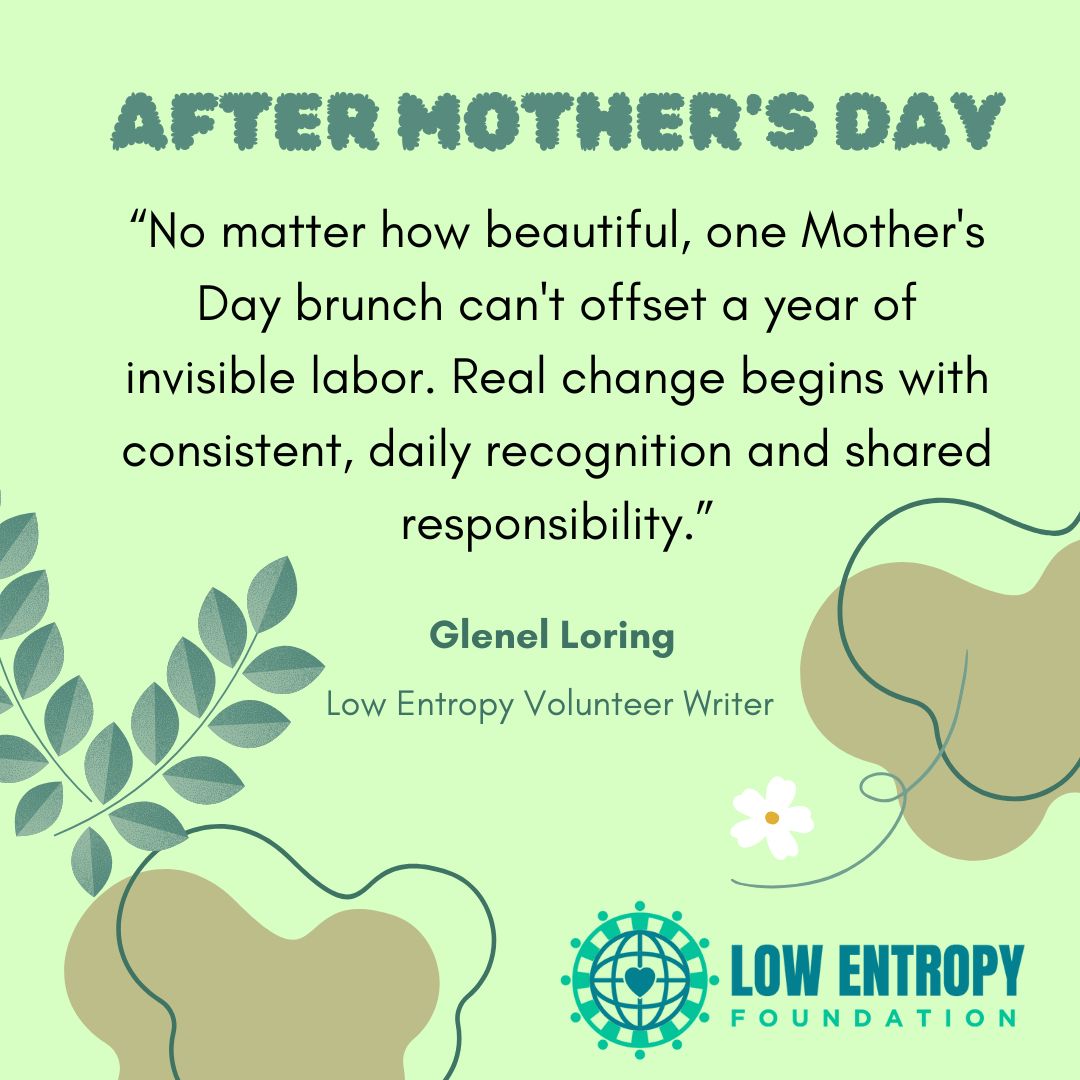Glenel Loring, Low Entropy Volunteer Writer
Once a year, we shower mom with flowers, cards and fancy brunches. Social media floods with touching tributes and perfectly filtered photos of mother-child moments. For one Sunday in May, mothers get their due.
But what about the other 364 days?
It’s worth asking whether Mother’s Day has become our collective excuse to overlook what mothers do year-round. Evidence suggests that most maternal contributions go unrecognized—until something falls through the cracks or disappears altogether.
How We Got Here
The original vision for Mother’s Day was quite different. Anna Jarvis, who pushed for the holiday after losing her own mother in 1905, wanted genuine, heartfelt recognition. When President Woodrow Wilson made it official in 1914, Jarvis likely didn’t imagine that within a few years she’d be protesting the commercialization of the very holiday she founded.
She envisioned handwritten letters, not mass-produced cards and $25 bouquets.
The Bible Got It Right
Interestingly, the commandment to “Honor your father and mother” isn’t a seasonal suggestion—it’s the fifth of the Ten Commandments. Even Jesus challenged the Pharisees for making ceremonial gestures while ignoring their duty to truly support their parents.
That sounds a lot like buying chocolates while mom continues to do 80% of the household management.
The Invisible Labor
Let’s consider the daily, invisible workload most mothers carry. Who remembers to schedule dental cleanings every six months? Who notices when shoes no longer fit, or that a relative’s birthday is coming up?
This mental load follows mothers like a shadow. A 2024 study found that moms handle approximately 71% of household mental load tasks and 79% of daily tasks like cleaning and childcare.
This unpaid labor consumes time and energy, yet it often goes unseen and unacknowledged.
“The clothes appear clean and folded. Dinner happens. Permission slips get signed. It’s all invisible until something falls through the cracks—then suddenly everyone notices.” — Jennifer, consultant and mother of three
The Emotional Heavy Lifting
But the most challenging work isn’t physical. It’s emotional.
Many mothers serve as their family’s emotional barometer and regulator. They’re the first to notice when someone’s mood shifts, a child is unusually quiet or tension is brewing.
“I’m constantly checking the room’s temperature. Who had a rough day? Who’s holding something in? I’m scanning for problems constantly, but nobody sees that happening.” — Tara, mother of two teens
This emotional vigilance rarely lets up. Most mothers describe it as working a mental double shift—managing their own emotions while tending to everyone else’s.
When Thanks Never Come
What happens when this labor is ignored?
Resentment builds.
Research from the University of Michigan indicates that working mothers juggling multiple jobs face a higher risk of depression, particularly when dealing with nonstandard work schedules or low earnings. This underscores the importance of acknowledging and addressing the mental health needs of mothers, especially those feeling underappreciated or overwhelmed by their responsibilities.
“I coordinated every holiday gathering with my husband’s family for years. One year, I stopped. When things fell apart, instead of appreciating what I’d been doing, they got mad at me for not doing it anymore.” — Michelle, nurse and mother of four
Breaking the Cycle
No matter how beautiful, one Mother’s Day brunch can’t offset a year of invisible labor. Real change begins with consistent, daily recognition and shared responsibility.
Practical Steps:
- Name specific tasks. A simple “Thanks for handling Tommy’s school forms yesterday” means more than a vague “You’re amazing.”
- Create systems to distribute family management fairly. Recognize invisible labor like emotional support and long-term planning.
- Teach kids to express appreciation regularly, not just on holidays. Early responsibility lightens mom’s load and equips children with life skills.
Success Stories
The Rodriguez family introduced a Sunday evening family meeting. “My eight-year-old now packs her lunch,” says Elena Rodriguez. “My 12-year-old manages his sports gear. These little changes mean I’m not frantically searching for missing cleats at 7 A.M.”
Mark recognized his wife was overwhelmed by the mental load. He created a shared digital calendar, taking over half the appointments and reminders.
“It wasn’t enough to appreciate her work—I needed to share it,” he explained.
Their kids, now 10 and 14, have their calendar and manage their schedules.
Beyond Brunches and Bouquets
Mother’s Day still matters. The flowers are lovely. The pancakes are sweet. But genuine appreciation shows up in the quiet moments: noticing the late nights spent finishing school projects, saying thank you for keeping family ties strong or acknowledging the times she drops everything to handle a crisis.
I watched my sister struggle last year when her husband forgot to help their kids plan anything for Mother’s Day.
“It’s not about the gifts,” she told me. “It’s that he doesn’t see what I do every single day.”
That conversation sparked fundamental changes in how they share parenting responsibilities—something far more valuable than any store-bought gift.
The Bottom Line
In the end, mothers want recognition for their actual contributions, not just symbolic gestures. The most meaningful Mother’s Day gift might be to see clearly, act consistently and share the work, especially when no one else is watching.
Maybe next year, we can celebrate moms by making sure they don’t need a special day to feel seen at all.
—
Leave your thoughts for Glenel in the comments below. You can also follow us on Facebook, Instagram, TikTok, Twitter and YouTube to stay up-to-date with Low Entropy news!

